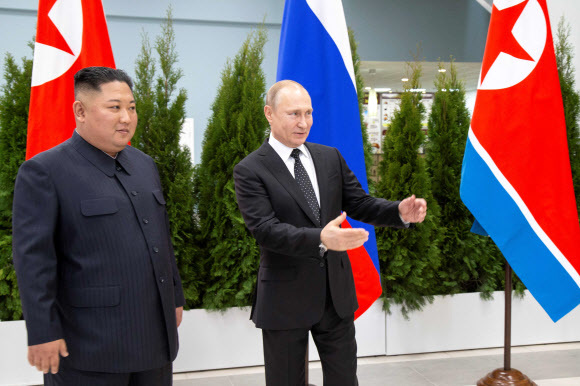Posted on : Apr.26,2019 16:20 KST
Modified on : Apr.26,2019 16:36 KST
 |
|
North Korean leader Kim Jong-un and Russian President Vladimir Putin at Vladivostok, Russia, on Apr. 25.
|
On Apr. 25, a summit between the leaders of North Korea and Russia was held for the first time in eight years. This was North Korean leader Kim Jong-un’s first diplomatic move since the North Korea-US summit in Hanoi at the end of February concluded abruptly, without an agreement. North Korea presumably organized the summit with the hope of strengthening its position in its denuclearization talks with the US by securing Russia’s support for its “phased and synchronous” solution before the talks resume, though the timeframe for that resumption remains undecided. We hope that this summit will help resume the denuclearization talks between US and North Korea and contribute to peace and stability on the Korean Peninsula.
Kim said that this summit was arranged for the two leaders to “trade opinions with each other about affairs on the Korean Peninsula and in the region,” while Russian President Vladimir Putin said that the summit would “contribute to resolving the Korean Peninsula issue.” In effect, the two leaders identified the denuclearization of the Korean Peninsula as the most important item on the summit’s agenda, which is quite significant given the recent deadlock in the North Korea-US negotiations. Importantly, Putin openly expressed his support for the “line of negotiations,” saying, “I support inter-Korean dialogue, and I also support efforts to normalize North Korea-US relations.” Russia’s attitude on such matters could have a positive effect on restoring a phase of dialogue over the denuclearization of the Korean Peninsula. While the two leaders also discussed the issues of expanding economic cooperation and people-to-people exchange between their countries, it’s widely presumed that such efforts would be limited by the UN Security Council’s sanctions on the North.
Following the collapse of the North Korea-US summit in Hanoi, the denuclearization negotiations are likely to be a very difficult process. On Apr. 24, US Secretary of State Mike Pompeo, when asked about the prospects of the negotiations, said, “It’s going to be bumpy, it’s going to be challenging.” But the fact that it’s tough going doesn’t mean we should give up. Now that North Korea has reconfirmed Russia’s support for its denuclearization negotiations with the US, it’s time for the two sides to jump back into those negotiations. They’ve had nearly two months to cool down since the Hanoi summit, and they need to bear in mind concerns that momentum for reopening the talks may fade as time goes by. In recent days, North Korea has reportedly been shuffling the officials in charge of negotiations with the US, replacing Kim Yong-chol, who has been responsible for the denuclearization talks, as director of the United Front Department of the Workers’ Party of Korea. Hopefully, those actions are intended to pave the way for resuming talks with the US.
North Korean nuclear weapons are an issue whose ramifications go beyond the Korean Peninsula. Their closely linked to the stability of Northeast Asia as a whole. We hope that the North Korea-Russia summit will serve to provide timely assistance on the journey toward the peace and stability of the Korean Peninsula.
Please direct comments or questions to [english@hani.co.kr]






